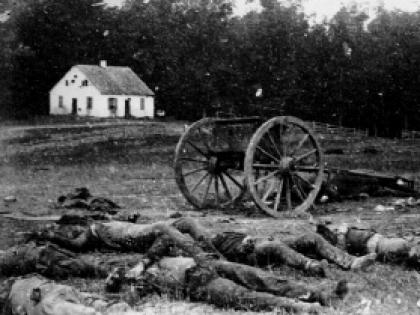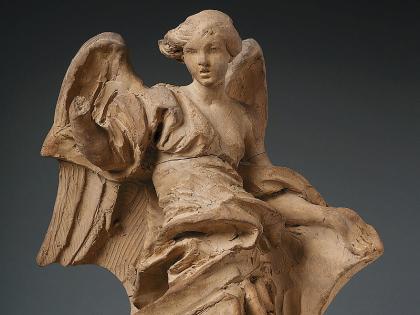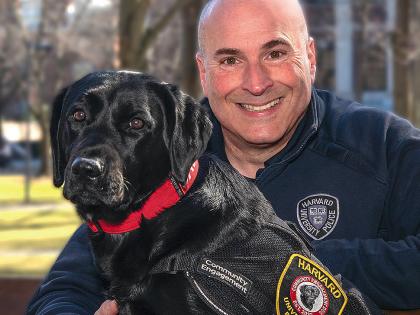“You have been undergraduates for 1,349 days. I have been interim president for 140 days,” began Alan M. Garber at the baccalaureate ceremony, an occasion when the president traditionally addresses graduating seniors. Alluding to the circumstances that thrust him into his new role as interim president, Garber continued, “Some might say that I am disadvantaged in this meeting, that I might be less than prepared to offer parting words of wisdom so late in your undergraduate journey—coming into focus for you just before I start receding in your rearview mirrors. But—you know what they say about those objects in mirrors—we are closer than we appear.”

Garber, trained as a doctor, then pivoted deftly to medical metaphor: “We physicians love to encounter rare cases,” he said, “but, more often than not, what appears rare—and, therefore, intellectually challenging—is actually common. As we say in the profession: When you hear hoofbeats, think of horses, not zebras. You, however, are the genuine article—zebras through and through.”
He recalled the difficulties this class had confronted—they were high school seniors who had just been offered admission to Harvard when the global pandemic struck, and then witnesses to the social upheaval that followed the murder of George Floyd—and he enumerated their achievements great and small (including the way they had scootered their way into the student handbook, “making ‘micromobility’ part of the Harvard lexicon” as they zipped across the Charles to classes in the Science and Engineering complex in Allston).

“Did you know that a group of zebras is called a dazzle?” Garber asked. “Cast in shadow, you shined brighter than anyone could have imagined you would—defying pessimistic notions of what community would look like in a public health crisis—finding connection and joy in one another even as you swabbed and tested your way to Crimson clarity.” (The double entendre includes an allusion to Crimson Clear, a pandemic-era app that enabled access to Harvard facilities hours after a negative COVID-19 test.)
As for wisdom, Garber’s advice was simple, and rooted in experience:
Seek inspiration in one another.
What I have found in my years since graduating is that few endeavors are more entertaining, or sometimes surprising, than watching your classmates succeed. After all, you knew them as they once were, lit from within by youthful ambition and eager to conquer the world after graduation—or, perhaps, just stupefied by scrolling TikTok all afternoon. Don’t worry. My current job seemed so unlikely to my classmates that some of them must be suffering imposter syndrome by proxy.
The Harvard College class of 1977, my class, includes some names you know—Steve Ballmer, Bill Gates, Peggy Hamburg, John Roberts—but it’s not any one of us that inspires me. It’s all of us together.
Our reunion class reports, also known as Red Books, are filled with stories of how fulfillment can come in myriad ways on widely varied life paths. My classmates have become artists, composers, and musicians; educators and entrepreneurs; globetrotters and trail runners. They have given TED talks about the future of news, drawn cartoons for The Economist, written for the Los Angeles Times, penned bestselling children’s books, produced Broadway shows, and climbed Mount Kilimanjaro. They’ve enjoyed the outdoors—as backpackers, birders, gardeners, cyclists, and runners—and they’ve worked to conserve the environment and protect the planet. They’ve built homes, created families, raised children, and welcomed grandchildren.
For all these many joys, however, they have also shared details of personal and professional transitions, powerful recollections of disappointment, disillusionment, and loss; and, more recently, poignant reflections on what matters most when the balance of a life has been lived: contentment, health, and love.
Their accounts of the diversity and the fullness of existence offer truth as old as this institution. What happens after any Commencement will always be a mix of sun and shade, triumph and failure, joy and sorrow. Your final assignment, if I can impose on you, is to cheer and support one another through it all, whatever may come. There is no greater comfort than keeping ties with those who knew you when.

Garber closed by referring to the recent, troubling events in the Middle East, and the way they have torn at the fabric of campus life.
This year, we have witnessed together incomprehensible death and destruction in the Middle East. We have experienced, directly and indirectly, grief and rage, sorrow and fear, skepticism and mistrust. The conflict has opened wounds throughout our community that will be slow—but not impossible—to heal.
On Thursday, we of divergent minds will process together into this space, a space created not by gains—but by losses. Behind me, Memorial Church, dedicated on Armistice Day in 1932, built by our predecessors to honor those from Harvard who served and died in the first World War. Behind you, Widener Library, opened on Commencement Day in 1915, built by a grieving mother in memory of her beloved son.
I hope that we are able to heed the lessons of those who preceded us, those who chose to make from their sorrow something new, something that would last. May the losses of this year—of human life and human connection—of sympathy and empathy—of care—be for all of you—for all of us—an impetus to advance rather than retreat, shining brightly in shadow, and brighter still through darkness.
If there is a Harvard Class that can illuminate a path forward for our world, it is yours. I am honored to have had this moment with you. I wish you contentment, health, and love—and everything else you hope to do with your precious time.
May you remain zebras among horses—dazzling every step of the way.

The Baccalaureate service, many elements of which hearken back to the religious origins of the earliest American colleges and universities, now includes readings by members of the senior class from Islam, Judaism, Buddhism, Sikhism, Christianity, and Hinduism, as well as the traditional singing of Psalm 78 to the tune “St. Martin’s,” an observance since at least 1806. This year, the ceremony also included two anthems composed by members of the class of 2024: “Journey On,” by Annika Huprikar ’24 of Quincy House, and “Commencement Hymn” by Chinyere Obasi ’24 of Leverett House.
The full text of Garber’s baccalaureate address appears here.









